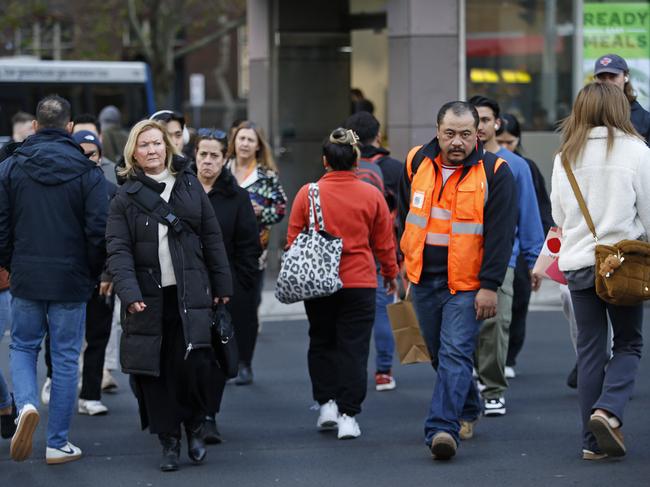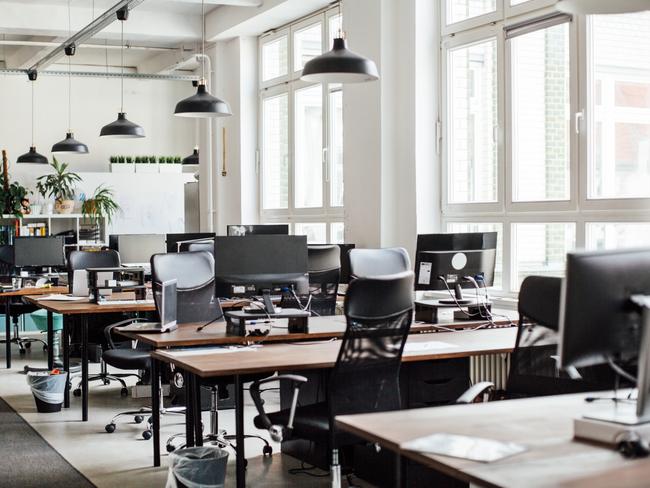‘Fundamental shift’ happening in workplaces across Australia
Workplaces across the country are on the precipice of “significant change”, with a report revealing the biggest sign yet a major work shift is here to stay.
At Work
Don't miss out on the headlines from At Work. Followed categories will be added to My News.
As we near the end of the year, it is clear that Australian businesses and employees are still trying to navigate how a workplace should look in 2024.
The past 12 months have been marked by an ongoing power struggle between employers and workers.
The aftermath of the pandemic saw employees retain a lot of bargaining power. Remote and hybrid work had become the new norm and the demand for workers was high, meaning employees held significant sway when it came to making salary and flexibility demands.
However, the worsening cost-of-living crisis and growing fear of job cuts soon saw Aussies reluctant to look for new work, meaning the power shifted in favour of employers.
We saw this manifest in a swath of companies reversing flexible work arrangements that staff had become accustomed to by announcing new return-to-office mandates.
Even now, the working from home and hybrid work debate continues to rage, but there is a sign that a new “fundamental shift” is coming to workplaces across the country.

MORE: 8 things you didn’t know you could be fired for
The recent 2024 Insights Report by Great Place To Work Australia has found that businesses are now finding themselves at the crossroads of “significant change”.
The report, drawing on survey data from over 144,000 employees across various industries and company sizes, highlights the key trends that are transforming the future of work in Australia.
Rebecca Moulynox, General Manager at Great Place to Work Australia, said we are currently witnessing a “fundamental shift in how Australian organisations approach workplace culture”.
She claimed the success of a company is now becoming heavily reliant on having strong leadership integrity combined with innovative, people first policies.
The report found that remote work was a key driver for employee engagements, with WFH and hybrid options leading to a 27 per cent increase in work excitement and a 22 per cent increase in colleague effort.
Reports of a better work-life balance also increased by 19 per cent. Staff with remote work opportunities were also six times more likely to recommend their workplace and two times more likely to stay long-term.
“Flexible work arrangements and sense of purpose are proving to be powerful drivers of employee engagement and retention, with measurable impacts on workplace satisfaction,” the report read.
One of the big factors behind the shift we are seeing across Aussie workplaces is the diminishing number of Baby Boomer and Gen X staff.
The report found 67 per cent of the workforce is now made up of Millennial and Gen Z workers, with younger generations often prioritising work-life balance more than those before them.
MORE: Workplace bullying examples

Speaking to news.com.au, Ms Moulynox said the fact that Gen Z and Millennials now make up the majority of the workforce is “significantly influencing” the future of WFH and flexible work arrangements in Australia.
“These younger generations value autonomy in choosing where they work, whether remote, hybrid, or onsite,” she said.
“However, while they appreciate flexibility, Gen Z, in particular, also values in-person interactions for learning and building connections.”
The Great Place To Work Insights Report shows that, while Gen Z are all about flexibility, they still find face-to-face communication essential for developing stronger, authentic relationships and building confidence in the workplace.
“This means that for companies, getting the balance right between remote and in-office days is essential,” Ms Moulynox said.
“A hybrid approach that allows for flexible WFH options while still offering regular in-person collaboration days can address Gen Z’s desire for mentorship, networking, and hands-on learning, alongside Millennials’ focus on balancing work and life.”
One company included in the report that has made “significant strides” in employee engagement through a focus on flexibility is Carsales.
The online automotive marketplace has introduced an “Autonomy to Choose” policy, which allows employees to choose office, hybrid, or remote work, depending on their professional and personal needs.
For up to 90 days each year staff can also choose to work from any global location.
One Carsales employee claimed the company’s flexible work policies allowed them to maintain a “healthy work-life balance”.
“It’s been a game-changer for me and many others in the team,” they said, according to the report.
The report also found employee engagement at the company increased to 80 per cent in 2024, up from 72 per cent n 2021.
Additionally, 93 per cent of employees recommend it is a ‘great place to work’ and 95 per cent report feeling supported when using flexible working arrangements.
When it comes to ensuring employees are satisfied with the amount of flexibility they have at work, Ms Moulynox said it is not the specific number of in-office days that matters most, but whether staff are given a choice in where they work.
“Companies that don’t provide this flexibility risk eroding trust, which can harm retention and weaken workplace morale,” she said.
“In contrast, organisations that balance business needs with employee choice are more likely to retain engaged, productive teams, even in a hybrid or partially remote set up.”
If the trend of companies introducing return-to-office mandes and forcing staff back into the office full-time continues into 2025, Ms Moulynox warned it could have negative impacts on businesses.
“For many employees, especially Millennials and Gen Z, RTO mandates may feel restrictive and signal a lack of trust in their ability to perform remotely,” she said.
“This could lead to higher turnover rates and disengagement, particularly if employees feel that their preference for flexibility is disregarded.”
More Coverage
Originally published as ‘Fundamental shift’ happening in workplaces across Australia





